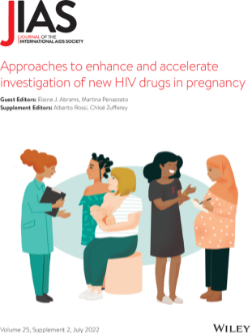Key background references
Report to Secretary, Health and Human Services Congress. Task Force on Research Specific to Pregnant Women and Lactating Women (PRGLAC), September 2018 (pdf available here).
Pregnant Women: Scientific and Ethical Considerations for Inclusion in Clinical Trials. US Food and Drug Administration, April 2018 (pdf available here).
Clinical Lactation Studies: Considerations for Study Design. US Food and Drug Administration, May 2019. (pdf available here)
Approaches to Enhance and Accelerate Study of New Drugs for HIV and Associated Infections in Pregnant Women: Meeting report. WHO and the International Maternal, Pediatric, Adolescent AIDS Clinical Trials (IMPAACT), 30 November 2021.
Research for informed choices: accelerating the study of new drugs for HIV in pregnant and breastfeeding women, a call to action. WHO, the International Maternal Paediatric Adolescent AIDS Clinical Trials Network (IMPAACT) and the International AIDS Society, 1 December 2021.
Report from June 2022 workshop on Inclusion of Pregnant and Lactating Persons in Clinical Trials. US National Academy of Sciences.

Journal of the International AIDS Society – Volume 25, Issue S2
Approaches to enhance and accelerate investigation of new HIV drugs in pregnancy. Guest Editors: Elaine J. Abrams, Martina Penazzato
July 2022
List of articles
- Disrupting the status quo to achieve early inclusion of pregnant women in studies of new agents for prevention and treatment of HIV infection. Abrams EJ, Penazzato M.; J Int AIDS Soc. 2022 Jul;25 Suppl 2(Suppl 2):e25927. doi: 10.1002/jia2.25927. PMID: 35851572; PMCID: PMC9294859.
- Accelerating investigation of new HIV drugs in pregnancy: advancing the research agenda from theory to action. Penazzato M, Lockman S, Colbers A, Renaud F, Calmy A, Clayden P, Vicari M, Mahaka IC, Zech JM, Irvine C, Abrams EJ; participants of the WHO-IMPAACT Workshop “Approaches to Enhance and Accelerate Study of New Drugs for HIV and Associated Infections in Pregnant Women”; J Int AIDS Soc. 2022 Jul;25 Suppl 2(Suppl 2):e25912. doi: 10.1002/jia2.25912. PMID: 35851834; PMCID: PMC9294865.
- The ethics of exclusion: why pregnant and lactating women must be front and centre of HIV research. Singh JA, Moodley D, Little M, Luna F, Littler K, Kumarasamy N.; J Int AIDS Soc. 2022 Jul;25 Suppl 2(Suppl 2):e25926. doi: 10.1002/jia2.25926. PMID: 35851759; PMCID: PMC9294868.
- Non-clinical considerations for supporting accelerated inclusion of pregnant women in pre- licensure clinical trials with anti-HIV agents. Greupink R, van Hove H, Mhlanga F, Theunissen P, Colbers A.; J Int AIDS Soc. 2022 Jul;25 Suppl 2(Suppl 2):e25914. doi: 10.1002/jia2.25914. PMID: 35851570; PMCID: PMC9294860.
- Approaches to accelerating the study of new antiretrovirals in pregnancy. Abrams EJ, Calmy A, Fairlie L, Mahaka IC, Chimula L, Flynn PM, Kinuthia J, Myer L, Khoo SH, Musoke P, Zwerski S, Zech JM, Lockman S, Siberry GK.: J Int AIDS Soc. 2022 Jul;25 Suppl 2(Suppl 2):e25916. doi: 10.1002/jia2.25916. PMID: 35851757; PMCID: PMC9294864.
- Clinical and population-based study design considerations to accelerate the investigation of new antiretrovirals during pregnancy. Brummel SS, Stringer J, Mills E, Tierney C, Caniglia EC, Colbers A, Chi BH, Best BM, Gaaloul ME, Hillier S, Jourdain G, Khoo SH, Mofenson LM, Myer L, Nachman S, Stranix-Chibanda L, Clayden P, Sachikonye M, Lockman S.; J Int AIDS Soc. 2022 Jul;25 Suppl 2(Suppl 2):e25917. doi: 10.1002/jia2.25917. PMID: 35851758; PMCID: PMC9294861.
- Pregnancy and medicines: time for paradigm change. Saint-Raymond A, Mofenson LM.; J Int AIDS Soc. 2022 Jul;25 Suppl 2(Suppl 2):e25906. doi: 10.1002/jia2.25906. PMID: 35851992; PMCID: PMC9294862.
- Surveillance of ARV safety in pregnancy and breastfeeding: towards a new framework. Renaud F, Mofenson LM, Bakker C, Dolk H, Leroy V, Namiba A, Sahin L, Shapiro R, Slogrove A, Thorne C, Vicari M, Low-Beer D, Doherty M.; J Int AIDS Soc. 2022 Jul;25 Suppl 2(Suppl 2):e25922. doi: 10.1002/jia2.25922. PMID: 35851994; PMCID: PMC9294858.
- Engaging the community of women living with HIV to tailor and accelerate ARV research for pregnant and breastfeeding women. Clayden P, Zech JM, Irvine C, Mahaka IC, Namiba A.; J Int AIDS Soc. 2022 Jul;25 Suppl 2(Suppl 2):e25920. doi: 10.1002/jia2.25920. PMID: 35851576; PMCID: PMC9294867.
Key organizations
The International Maternal Pediatric Adolescent AIDS Clinical Trials (IMPAACT) Network is a “global collaboration of investigators, institutions, community representatives, and other partners organized for the purpose of evaluating prevention and treatment interventions for HIV and HIV-associated complications and co-morbidities in infants, children, and adolescents, and during pregnancy and postpartum through the conduct of high-quality clinical trials.”
Advancing Clinical Therapeutics Globally (ACTG)
Hepatitis Transformative Science Group
The ACTG Hepatitis Transformative Science Group facilitates trials of novel therapeutics for liver disease related to hepatitis B, hepatitis C, and metabolic disorders, with a focus on people living with HIV, including women’s health. In collaboration with members of the group and the ACTG, individuals can propose prospective studies, studies using existing ACTG data, and studies using stored samples, to answer questions relevant to women’s health and hepatitis.
Women’s Health Collaborative Science Group
The Women’s Health Collaborative Science Group (WHCSG) works to develop optimal strategies to treat HIV and related complications among women. The WHCSG collaborates across the ACTG to develop studies that address scientific questions of high importance to the health of women living with HIV throughout the lifespan, and seeks to optimize recruitment, retention, and sex-specific analyses of women in clinical trials. The WHCSG can serve as a consultative group for researchers interested in proposing studies related to women’s health and in collaboration with members of the WHCSG and the ACTG, individuals can propose prospective studies, studies using existing ACTG data, and studies using stored samples, to answer questions relevant to women’s health.
Disclaimer
The provision of study materials and links from the toolkit to other websites is provided for your convenience and does not indicate endorsement of those materials or sites by WHO. WHO accepts no responsibility for the validity or accuracy of their content. The mention of specific companies or of certain manufacturers' products does not imply that they are endorsed or recommended by WHO in preference to others of a similar nature that are not mentioned. Errors and omissions excepted, the names of proprietary products are distinguished by initial capital letters.
